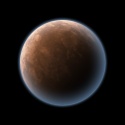
|
I see the contestants are making their way out onto the starting grid. This article was originally created as an entry for a Dark Crusade competition and is not official DJB canon content. It is preserved here for historical purposes only.
|

|
| Krayiss System
|
|
|
|
|
|
R-5
|
|
Krayiss
|
- Krayiss One
- Theodore's Asteroid Belt
- Krayiss Two
- Krayiss Three
- Wilhelm's Asteroid Belt
- Krayiss Four
- Krayiss Five
|
|
Contested:
|
The Krayiss System which is located deep within the Esstran Sector exists as somewhat of an anomaly in astrological terms. Consisting of two planets and an asteroid field with extremely close orbits to the star Krayiss, and three orbits at what is a more common distance to the galactic standard. However, due to it being within the Stygian Caldera, the natural hyperspatial breakwater that hard guarded the Sith Empire from attack for so many years, only the most cursory of scouting and mapping missions have ever charted the system.
Orbit Information
Primary
The Star Krayiss is an M-Class star. As a red dwarf star, it is red and relatively cool in astrological terms. Only the three innermost orbits of the system receive enough heat from the star to even be considered in the habitable range by the majority of species in the galaxy.
Krayiss One
 Krayiss One
Krayiss One
Krayis One is the first orbit in the Krayiss system. It has a very close orbit, and its orbital period is only 42 standard days long. It possesses no discernable atmosphere, and surface temperatures are too hot for any habitation.
Theodore's Belt
The name of this asteroid belt is shrouded in mystery, but the belt itself seems to have been formed from the collision of two planets that previously held orbits in between Krayiss One and Krayiss Two. This is a dense asteroid belt that circles the star Krayiss on a perpendicular angle to the orbit of Krayiss One and Two.
Krayiss Two
 Krayiss Two
Krayiss Two
Krayiss Two is the only truly habitable planet of the Krayiss System. Consisting of a lunar cycle of approximately 169 Galactic Standard Days. Technically in the third orbit of the system, Krayiss Two is most famous for it being the location of a Sith library-temple.
Krayiss Two has two moons, Hakagram and Nakru.
Krayiss Three
 Krayiss Three
Krayiss Three
Krayiss Three is a gas planet which is orbited by a miniature asteroid belt, giving it celestial rings. The atmosphere consists of mostly carbon dioxide, creating what is in effect a massive greenhouse. Surface temperatures exceed a mean temperature of 521 degrees Celsius. It's year consists of 1089 Galactic Standard Days.
Krayiss Three's only moon is named Vodal, a reference to a long deceased Sith Lord.
Wilhem's Belt
 Wilhelm's Belt
Wilhelm's Belt
Another asteroid belt whose name is shrouded in mystery, Wilhelm's asteroid belt seems to be the progenitor of Krayiss Three's ring system. As it orbits just outside of Krayiss Three's elliptical, Krayiss Three is slowly gathering all of the asteroids from Wilhelm to itself, and initial observations expect that within the next 2 million years, Wilhelm's asteroid belt will have disappeared completely.
Krayiss Four
 Krayiss Four
Krayiss Four
Krayiss Four is a true gas giant, comparable in size to Endor. Its atmosphere consists of a harsh mix of toxic elements, constantly churning in chemical and magnetic storms. The electromagnetic interference resists all attempts to sink probes into its atmosphere, designating the planet as worthy of earning the official hazard to space travel label. Krayiss Four's standard year is 4322 Galactic Standard Days.
Krayiss Four possesses three moons, Domoru, Rath, and Chaskar, all named after famous Sith from the past.
Krayiss Five
 Krayiss Five
Krayiss Five
Krayiss Five is the final orbit in the Krayiss System. Consisting of a single dwarf planet on the very edge of the system with no moons, Krayiss Five was almost misidentified as a comet. However, consisting of a nitrogen, methane and carbon-dioxide atmosphere, it was correctly classified as a planet. Krayiss Five's standard orbital rotation takes 40,424 Galactic Standard Days.
Scouting Party